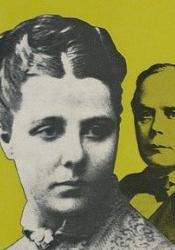The Trial of Annie Besant and Charles Bradlaugh
On Thursday, April 5th, 1877, Annie Besant and Charles Bradlaugh were placed on trial for re-publishing Charles Knowlton’s Fruits of Philosophy, a pamphlet that provided instructions and opinions on birth control as a way to combat overpopulation. The pamphlet, which had been on sale for more than forty years before its re-publication, was purportedly in direct opposition with the Obscene Publications Act of 1857, which outlawed all salacious literature (Banks). Besant and Bradlaugh were both prominent atheists and “freethinkers,” and were quickly demonized by proper Victorian society (Diniejko). The trial, which lasted four days and ended with an acquittal, was highly reported by British press, and while the coverage was harsh in opinion, it was the first time contraception had ever been mentioned on a national level. The publicity directly caused a spike in sales for the book itself, and brought the reality of birth control and sexual liberation to dinner tables across the country.
Fruits of Philosophy did not fit with the Victorian idea of sex and broke stringent rules of privacy. The book includes information on nocturnal emissions, recommendations for tinctures to be used for a man’s arousal, description of the withdrawal method, as well as multiple uses of the medically accepted term for genitalia (Knowlton). The book speaks frankly on the desire for sex: “…surely no instinct commands a greater proportion of our thoughts or has a greater influence upon happiness for better or for worse” (Knowlton 117). The chief purpose of the book’s initial publication was to combat the issue of overpopulation, which was considered the source of the majority of society’s ills. This idea was made popular by the English economist and clergyman Thomas Robert Malthus in the early 19th century; both Besant and Bradlaugh were prominent Malthusians, and their involvement in the movement led to their creation of the new edition in 1877 (Diniejko).
Many believed that the harsh reality of pregnancy as a consequence of intercourse was the main - if not only - thing preventing a portion of the population from turning towards “immoral living,” and majority of the press coverage reflects that narrow ideal (Banks 7). Some publications praised the justice of Malthusian theory but were unable to separate the perceived licentiousness of the book’s contents from its purpose. The Englishman, a British newspaper published in Calcutta, India, reported that the pamphlet’s contents included “‘(1) the way of safely indulging the passions; and (2) of destroying human life, which is the necessary result of that indulgence’” (Banks 8). The Manchester Examiner and Times praised the idea of self-restraint, while additionally commenting that “‘it would be better to lose our life than to save it by measures which would rob it all of worth and dignity’” (Banks 7). The Daily Telegraph’s coverage of the trial equated the publication of the book with selling poisoned food, or purposefully placing deadly drugs in public drinking fountains (Banks 7).
The negative press coverage, while hostile, inadvertently acted as the book’s best advertisement. The sale of Fruits of Philosophy increased by 178% in the months surrounding the trial: “As opposed to a previous average circulation of about 700 copies a year, between March and June, it was estimated, no less than 125,000 copies were sold” (Banks 4). During the trial itself, bootleg renditions of the pamphlet were sold outside of the courtroom. In June of 1877, just two months after their acquittal, Besant and Bradlaugh gave their first public address to a room full of 600 fans, with 400 more standing on the street – a third of them young women (Banks 12). Later that year, Besant capitalized on her new-found audience, and published a piece of contraception propaganda of her own, titled “The Law of Population: Its Consequences, and Its Bearing upon Human Conduct and Morals.” The work was immensely successful, and when Besant withdrew it from publication twenty years later, “it had sold 175,000 copies in England, had been reprinted in the United States and Australia, and had been translated into German, Dutch, Italian, and French—making it among the most widely circulated tracts on contraception in its time” (Sreenivas 14).
While Fruits of Philosophy was not the first piece of literature on birth control to reach Great Britain, the scandal that resulted from the 1877 trial of Anne Besant and Charles Bradlaugh made it the most well-known by far. The scathing press coverage reflected the long-accepted Victorian societal norms surrounding sex, privacy, birth, and family, but was not the most accurate representation of the opinions of the British people. The Malthusian mission appealed not only to the social reformer or the young individual for whom sex was a matter of curiosity - poor parents of large families for whom children represented a large monetary burden were provided with instructions for family planning for what was most likely the very first time. In the years after the trial, the English fertility rate lowered considerably, and while the movement behind Fruits of Philosophy had been in the works for some time, it is difficult to overstate the importance and influence of the trial, as well as all the “bad” press that came with it (Banks 13).
WORKS CITED
Banks, J. A., and Olive Banks. “The Bradlaugh-Besant Trial and the English Newspapers.” Population Studies, vol. 8, no. 1, 1954, p. 22., doi:10.2307/2172561.
Diniejko, Andrzej. “Annie Besant's Multifaceted Personality. A Biographical Sketch.” The Victorian Web: Literature, History, & Culture in the Age of Victoria, 20 Nov. 2014, www.victorianweb.org/authors/besant/diniejko.html.
Knowlton, Charles. “FRUITS OF PHILOSOPHY.” Edited by Annie Besant and Charles Bradlaugh, The Project Gutenberg EBook of Fruits of Philosophy, by Charles Knowlton, 1 Dec. 2011, www.gutenberg.org/files/38185/38185-h/38185-h.htm.
Sreenivas, Mytheli. “Birth Control in the Shadow of Empire: The Trials of Annie Besant, 1877–1878.” Feminist Studies, vol. 41, no. 3, 2015, p. 509., doi:10.15767/feministstudies.41.3.509.
Image courtesy of secularism.org

